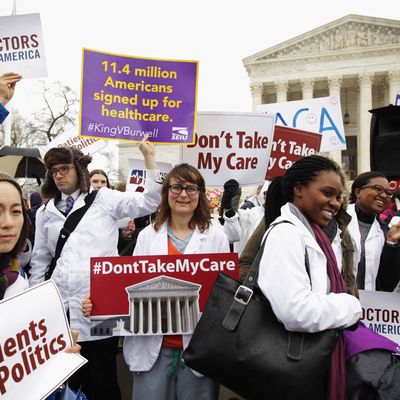
Today, the Supreme Court heard oral arguments in King v. Burrell, the second case concerning Obamacare to reach the high court. The plaintiffs in the case argue that the text of the bill shows that the tax subsidies helping poor people afford insurance only apply in the 13 states — plus the District of Columbia — that set up their own health-insurance exchanges, while the government says that Congress intended to offer subsidies even in states that refused to set up exchanges. As The Wall Street Journal put it today,
>The outcome in the case may hinge on a single word in a statute that runs more than 2,000 pages. The challengers argue that because the law uses the word “by” instead of “for” in the clause an “exchange established by the state,” the subsidies are limited to residents of states operating their own exchanges.
As with many of the most contentious Supreme Court cases, many experts who watched the argument think that Chief Justice John Roberts or Justice Anthony Kennedy are the key votes to watch when predicting how the decision will unfold. Roberts, who was the deciding vote in the 2012 Affordable Care Act case, almost challenged Justice Clarence Thomas for the title of Most Silent Supreme Court Justice, saying almost nothing that signposted where he stood.
However, SCOTUSblog notes “One might suspect, though, that he would not necessarily be comfortable in voting on the losing end in this historically profound case.”
As with many of the most contentious Supreme Court cases, many experts who watched the argument think that Chief Justice John Roberts or Justice Anthony Kennedy are the key votes to watch when predicting how the decision will unfold. Roberts, who was the deciding vote in the 2012 Affordable Care Act case, almost challenged Justice Clarence Thomas for the title of Most Silent Supreme Court Justice, saying almost nothing that signposted where he stood.
However, SCOTUSblog notes “One might suspect, though, that he would not necessarily be comfortable in voting on the losing end in this historically profound case.”
Justice Kennedy, the other unknown, expressed concern with the way both lawyers argued their case. However, he also focused on what would happen if the subsidies fell, according to SCOTUSblog’s analysis. States that did not initially wish to set up exchanges would suddenly have to deal with the fact that many of their residents could no longer afford health insurance.
Protecting federalism has been a hallmark of many Kennedy votes.
He asked Michael A. Carvin, who represented the plaintiffs, “If your argument is accepted, the states were told to establish exchanges in order to receive money [for their citizens] or send the insurance market into a death spiral; isn’t that coercion? Under your argument, there would be a serious constitutional problem.”
Solicitor General Donald B. Verrilli Jr. represented the government, reprising his role as Obamacare’s chief legal defender. Justice Antonin Scalia debated with Verrilli over what would happen if the court sided with the challengers. Scalia, who usually sides with the conservatives on the Court, said that states would have an opportunity to create exchanges and get back subsidies, thus avoiding any “dire consequences” that would result from altering Obamacare.
And, if as Verrilli said, there was not enough time to do so before the subsidies evaporated, Congress could do something. “Do you think Congress is just going to sit there and let all of these disastrous consequences occur?” Scalia asked. “If there are disastrous consequences, Congress will react.”
One health-care consulting firm estimates that more than 7 million Americans in 34 states could lose financial help with insurance costs if the Court sides with the plaintiffs.
The final decision is expected during Supreme Court sweeps season this June.
If you are feeling very ambitious, you can read the transcript of the entire 80-minute affair right here.





























